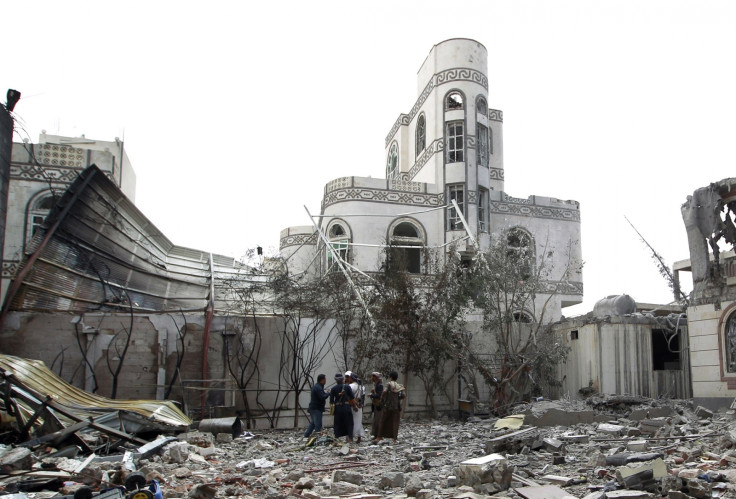We need an immediate suspension of British military sales to Saudi Arabia

For over a year now, the British government has flatly rejected claims that the Saudi Arabian-led coalition has violated the laws of war during its conflict in Yemen, despite overwhelming evidence to the contrary. Although the British government supplied nearly £3 billion worth of weapons and equipment to the Saudis in 2015 alone, ministers insist that Britain's arms export licensing procedures are amongst the most stringent in the world and that there's no serious risk of British supplied equipment being used unlawfully. But these claims - already disingenuous and misleading – were further discredited this week by fresh evidence from Amnesty International that banned British-made cluster bombs have been used by coalition forces in Yemen.
Since March 2015, there have been a number of well-documented attacks by the coalition using cluster munitions in populated areas. Human Rights Watch has researched 16 such attacks, in which at least 19 civilians were killed and at least 66 wounded. But this is the first identified case involving a British-made cluster bomb.
Amnesty researchers found one partially unexploded BL-755 bomb, manufactured by Hunting Engineering Ltd., in the 1970s, which was evidently used by the coalition in Yemen's Hajjah Governorate, six miles from the Saudi border. Cluster munitions, which are designed to release smaller bomblets that scatter over a wide area, pose a particular danger to civilians, especially children who pick up unexploded ordnance without realising what they are. Each BL-755 contains 147 submunitions.
It's true that these British-made bombs were sold to a coalition member before the existence of an international convention banning cluster munitions, which Britain ratified in 2010 and has since championed. Nonetheless, the fact that such weapons are still being used by a coalition which we support and arm would normally prompt an investigation and a serious review of British policy. But these are not normal times. In recent months, British policy on Yemen appears to have hardened, becoming more supportive of the coalition in Yemen and more dismissive of the human rights groups that expose their violations.
Just last month, for example, Foreign Secretary Philip Hammond made a series of claims about coalition actions in Yemen that don't withstand scrutiny. Four are particularly worth highlighting.
Firstly, he said that "the Saudi-led coalition is not targeting civilians". But Human Rights Watch and others have identified multiple cases in which the Saudi-led coalition has launched airstrikes against markets, hospitals, clinics, schools, civilian factories and wedding parties, as well as private homes. Similar cases were extensively documented by the UN Panel of Experts, which identified 119 separate coalition sorties which it judged were unlawful. In many of the cases we investigated, the attacks failed to discriminate between civilians and combatants, caused disproportionate harm to civilians, or we found no clear military objective in the area. Many of the attacks amounted to serious violations of the laws of war. And some cases may be war crimes.
Secondly, Hammond said that Saudi Arabia has put in place procedures "to ensure respect for the principles of international humanitarian law". It's true that in January the coalition did finally announce the creation of a committee to assess the rules of engagement in the context of the conflict. But even the coalition's military spokesman said that the objective of the committee was not to carry out specific investigations.
Thirdly, the Foreign Secretary claimed that Saudi has "engaged in constructive dialogue" with the UK about incidents of concern. But this view was contradicted by Hammond's own ministerial colleague at the Foreign Office, Tobias Ellwood. Ellwood told a parliamentary committee in April that he phoned the Saudi Ambassador to the UK to complain that Riyadh was taking too long to investigate incidents, the process was "frustratingly slow", and that the Saudi response had "been found wanting".
Finally, Hammond says Saudi Arabia "remains genuinely committed" to complying with the laws of war. This is an extraordinary claim given the reality of ongoing and large-scale violations of the laws of war by the Saudi-led coalition in Yemen that have continued for over a year, and Riyadh's refusal to acknowledge or properly investigate them.
As the British government has become more entrenched in its position on Yemen, it has been sharply criticised by the main opposition parties and some of its own backbenchers. Given the scale of the violations, and the documented use of British-supplied equipment, parliamentarians should demand an immediate suspension of British military sales to Saudi Arabia and a full and independent investigation. Anything less will make Britain complicit in further abuses and the ongoing intolerable suffering of the Yemeni people.
David Mepham is UK Director of Human Rights Watch
© Copyright IBTimes 2025. All rights reserved.






















